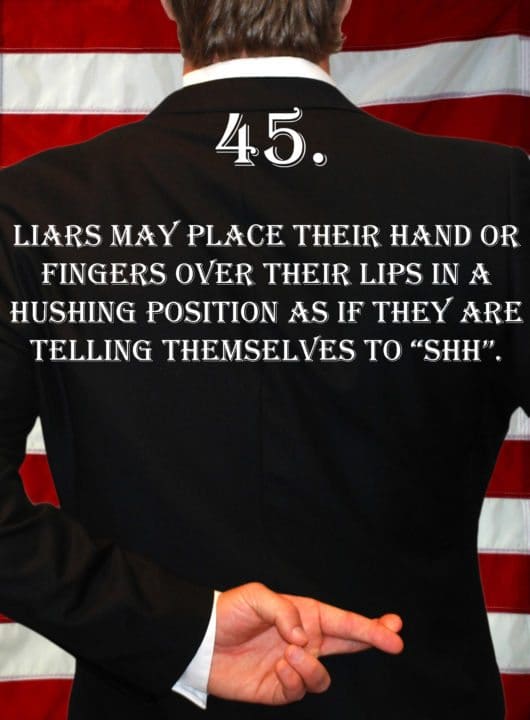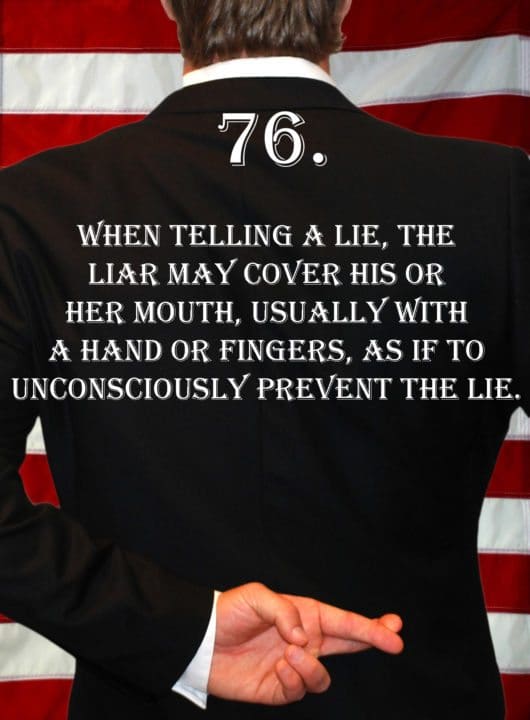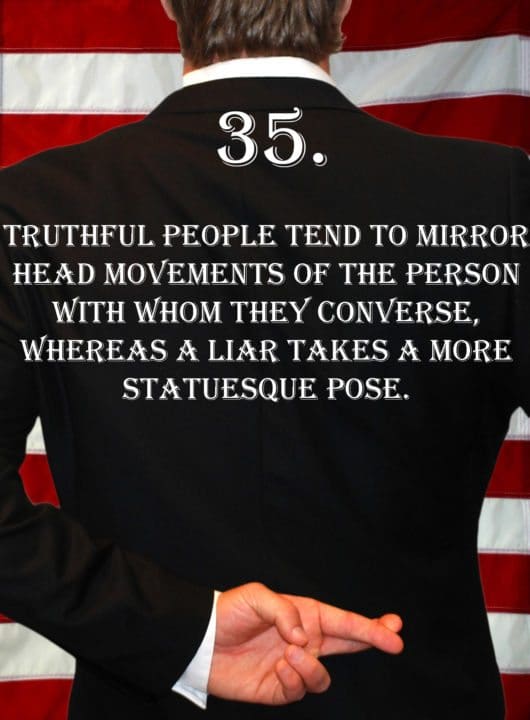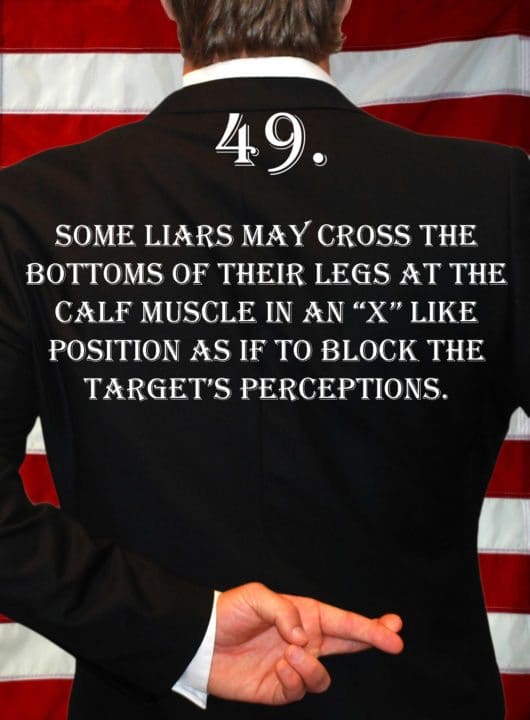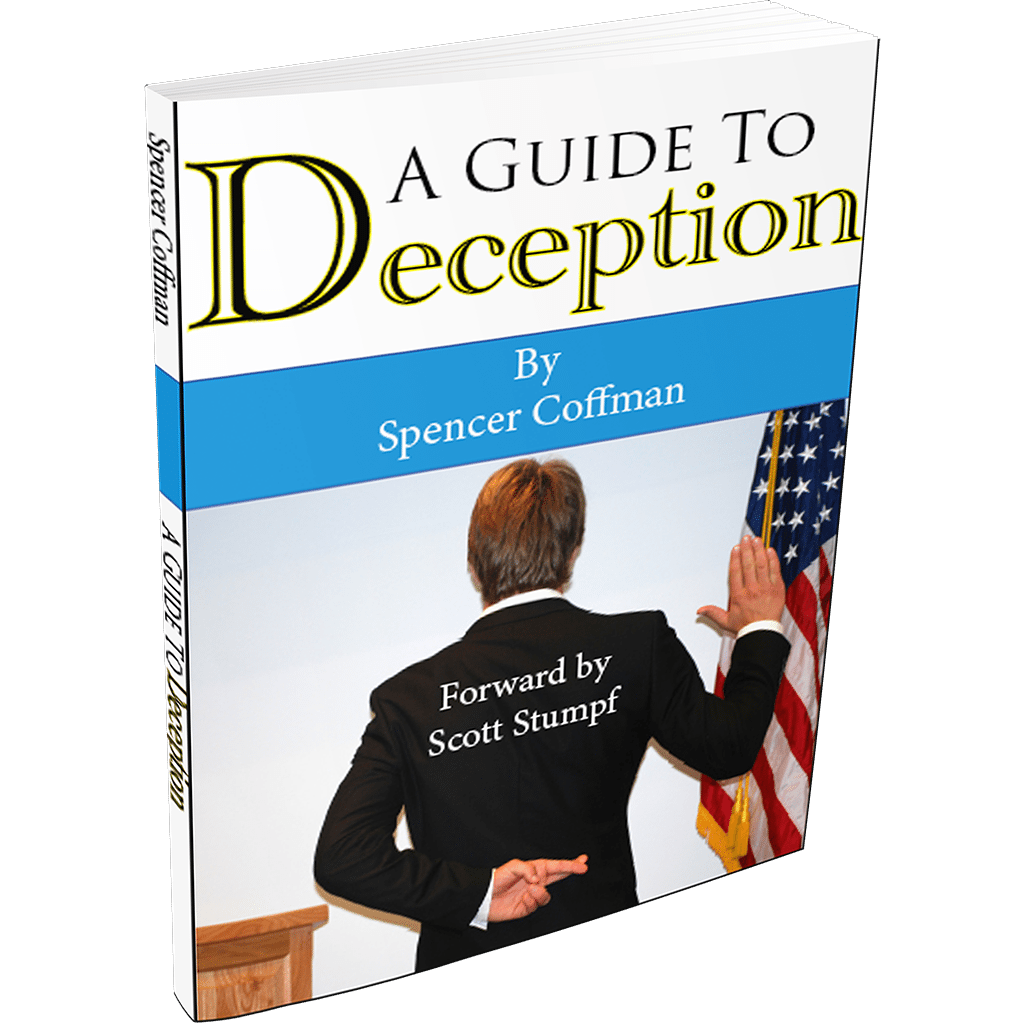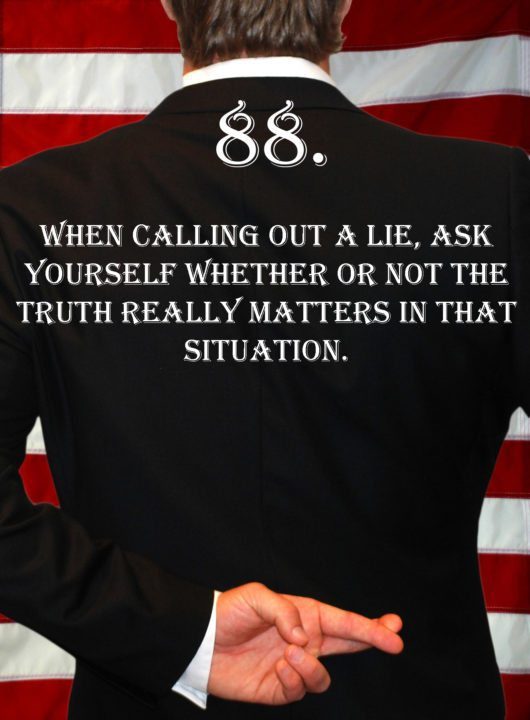
Deception Tip 88:
When calling out a lie, ask yourself whether or not the truth really matters in that situation.
Listen To The Podcast!
E88 – Calling Out Lies – Deception Tips Podcast – Click Here To Subscribe
Podcast Transcript
Hello and welcome to the Deception Tips podcast where you will learn amazing cues to detect deceit that will help you read people like never before. I’m your host Spencer Coffman, let’s get started.
Hello and welcome to episode number 88 of the Deception Tips podcast. Last week, we talked all about display rules and how people learn to lie as they get older. They’re taught to lie by their parents, grandparents, peers, and those around them. Of course, children are born inherently with a devious nature, you have to teach them how to be good, they know how to be bad, it’s inherent in us.
However, lying is something that yes, they may know how to do it when they’re little and it may be born in them but they are not really good at it until they grow older.
That’s pretty obvious because as they grow older, they obviously lie a little bit more, and then they have more practice, and practice makes perfect. That doesn’t mean you should go out and practice lying though, you should practice telling the truth.
As children grow up, they’re taught to lie through these display rules, such as receiving a present from a grandmother. You teach the kid, hey, you need to be polite, you need to say thank you, even though you don’t like it, or you didn’t want it or it wasn’t what you were asking for, like a pair of socks, I hated getting those on Christmas.
Things like food, when you’re at the meal table or you’re at someone’s house, if you tell your children, you say, hey, I know you’re going to go over to little Tommy’s tonight. If they cook you something that you don’t like, be polite, don’t say it’s gross, tell them you’re full, eat everything else. You teach them to be polite and that is deception, that is lying.
Again, we brought up the question of, okay, well, should they tell the truth in those circumstances? Probably not. Why? Well, because what would be the point of telling the truth, saying, you know what, this food is terrible, I’m not going to eat it, that is very rude, inconsiderate, and just not nice. So, instead of being blatantly obvious or telling the truth that way, you could find a nicer way, to tell the truth.
You eat the rest of the food on the plate and you say, you know what, I’ve had enough. You have had enough because you don’t want any more of that other stuff that’s on your plate. There are ways where you can tell the truth and still tell them that you don’t want whatever it is.
For example, the story last time of the little kid did you like my play or my joke, I think was the example. You say you know what? I like it when you told it but if anyone else would tell it, I wouldn’t like it. Okay, you don’t like the joke, but because they told it and you like them, you told them that without breaking their hearts, saying no, it was a terrible joke. You do not need to be an insensitive jerk.
Today we’re talking about a tip that is similar, although this is on the other hand. Instead of being polite and lying or telling these polite lies or socializing or learning lies, this is on Calling Out Lies. So, you’ve had a lot of practice reading people, learning body language, and understanding deception. Why have you had a lot of practice? Come on, this is episode 88.
Hopefully, you’ve been listening to all the others, that’s 87 plus the trailer, you’ve probably listened to 88 episodes already. In addition, if you’re really avid, you probably read The Deception Tips book, The Deception Tips Revised and Expanded, A Guide to Deception, maybe even have looked at all the blog posts. You could have even possibly watched all the videos as well, so you really have a lot of practice at this, not to mention if you’ve studied anybody else’s stuff.
Therefore, what are you doing with all of that knowledge, all of that practice? Are you looking around and calling out everybody’s lie? How are you doing today, sir? Oh, I’m great. Ah, I don’t think you’re doing too great, you did this and this, which means there might be some deception there.
How do you like my cooking? Oh, it’s awesome. Oh, I don’t think so, I saw a little disgust on your face when you said that. Are you calling out every single lie you see? Well, hopefully not but either way, we are going to talk about that today and whether or not you should or shouldn’t be pointing out all of these little lies and whether or not it’s important.
So, without further ado, here it is, this is Deception Tip number 88. When calling out a lie, ask yourself whether or not the truth really matters in that situation. Here it is again, Deception Tip number 88. When calling out a lie, ask yourself whether or not the truth really matters in that situation. So, this is important. When you are calling out lies, you need to make sure that it matters.
Things like whether or not someone enjoyed their food or whether or not someone is really doing well, may not matter. However, if it’s someone that you care about and you want to know what’s going on and they say they’re fine and you read on them, oh, well they say they’re fine but you know what, deep down inside, I can see that they want to talk.
So, you could say, okay, well what’s going on? Then they would start to spill their guts for you because you read their body language and you understood that they’re not fine, something else is going on.
So, now you got to the root of the matter, they said fine, which was a lie and it was a polite, social lie because they don’t want to burden everybody with their problems. You prodded and you asked them to and then they unload it on you, so that would be one way.
Another thing is let’s go back to the food example. If you have a child and they’re your kid, they’re a guest or someone you care about and you can see that maybe they don’t like that food but they’re trying to be polite, they’re a good kid. They’re eating it, they’re saying, no thank you, please, can I have some more of this and all that stuff.
You see that maybe they’re not liking that and you watch their body language, you could say, you know what would you like me to make you a peanut butter sandwich to go with that? Maybe they would or you could maybe offer something else, would you like some more of this because you saw that they really liked the mashed potatoes on the table.
Hey, would you like some more mashed potatoes? You don’t have to eat that other stuff, you could have all the potatoes you want and that little kid will light up and be happy. You saw that they were being polite, they didn’t really like the food, you don’t have to call them out in the lie and say, hey, why don’t you like my cooking? What’s the matter with you, I’m not a good cook?
That poor kid is going to be barraged with a ton of questions that they don’t want to answer because they’re going to feel uncomfortable and they haven’t had that practice. Anybody would, you challenge an adult like that and they’re going to lose their mind, it’s not normal for them. So, the question is whether or not you should be always calling out lies every time you see them.
You can still call them out nicely as I did there, instead of saying, what’s the matter with you, you don’t like my cooking or I’m not a good cook, you don’t want to eat that? You could say, hey, would you like to have some more potatoes? You don’t have to eat that other stuff. So, you called out their lie because they were being deceptive about the food but you did it in a nice way and gave them something else.
You can do these things nicely, you just need to think about them and that’s all it really is. If you can read people and understand their body language, you are achieving a new level of insight into the human condition. You’re starting to care more about other people. Why are you caring more? Well, because now you know what they’re truly feeling.
If you know and understand what they’re feeling then you’ll be able to meet or achieve, express, see, and understand the needs that they have. It’s your choice whether or not you are going to help them achieve those needs. We’re going to talk a lot more about all of this coming up right after this.
People are always being fooled by lies because they don’t know how to spot them. When more people like the Deception Tips Facebook page, fewer people will be fooled by lies.
Welcome back to Deception Tip episode number 88, where we are talking about whether or not it is right or wrong or important, or whether or not it even matters that you call out every single lie you see. If you notice a lie, should you point it out and say the truth, should you call people out on their lies every time?
Well, it goes hand in hand, it’s back and forth, two sides of the coin, one side says yes, because people need to be honest. People need to know that you can spot their lies so that there’s no point in them lying to you. On the other hand, you don’t want to be an insensitive jerk that’s always pointing out every time someone is lying.
You go to a meeting and someone says, hey, how’s it going? You’re watching this conversation and they say, oh yeah, blah, blah, blah and you say, ah ah ah, that’s not what happened, I know you’re lying on that.
Well, now you just made them look bad in front of whoever they’re talking to and the person that they’re talking to probably doesn’t care whether or not you pointed out a little, insignificant lie.
That’s the key to this entire matter here, so is it important that you call out all the lies? No. Is it important that you call out the bigger lies? Yes. So, if you remember, last week we spoke of high stake and low stake lies. We used other terms, significant, insignificant, harmful, malicious, unimportant, all kinds of different quotes or terms, white lies, polite lies, social lies.
So, basically, anything that is a low stake lie, which is those lies that are polite, and social. How are you doing today? Did you like the food? How do you like my haircut?
They’re white lies, those are really not that important. Does it really matter if people know the truth in that situation? If your answer is yes then it is important, maybe it’s important to you or maybe it’s important to someone else around you.
However, in general, those polite and social lies, they’re not life dependent, it’s not a life-or-death situation, it’s not going to ruin someone’s career, they’re just embarrassment.
So, whether or not it’s important for you to embarrass someone or to not embarrass someone, is up to you. For me, I let a lot of those lies go even though I may know something else is going on.
Sometimes I’ll even go up to the person afterward, privately, and say, hey, you said you were fine but I don’t know if I believe it, what’s going on, and see if they want to open up to you. If they say everything is fine, they’re not ready to talk or they don’t want to talk to you. You could even tell them, you know what, I can see something is going on, you don’t want to talk to me.
That’s fine but I encourage you to talk to somebody, do something about it, and don’t just hold it in. They might say, go take a hike or tell you to shove off but you’ve at least expressed it and you’ve shown them that you care.
So, someday, if they are ready to talk, they’ll come to you. That’s all you have to worry about is in the minute, you don’t need to embarrass everybody every single time they lie.
On the other hand, high stakes lie, now we’re talking serious business, blackmail, extortion, lying to save lives, covering up murder or other crimes, things like that. Are these important to uncover? Well, chances are most of you listening to this do not have to deal with high-stake lies on a daily basis. However, if you do, then you need to judge each situation differently.
Are you going to save lives or take lives? Are you going to catch bad guys or harm good guys? So, the question really is which side are you on? If you want to catch the bad guys, then yes, you probably need to expose some lies.
If you have a suspect in custody and they’re lying and you want to find out who robbed the grocery store, who solved the murder, who has the drugs or the shipment of guns, or whatever industry you are in.
If you’re in law enforcement, then yes, it is a good idea to expose those lies, call out that person, and get them to tell the truth, that’s what this whole podcast has been about.
However, if you’re in the world of espionage or politics and the things that you reveal may ruin someone’s career or end someone’s life, well then you need to think a little bit more on that one.
Is the person’s career you’re ruining, do they need to be removed from their position? If yes, well, by who, on what authority? That’s something that you really have to think about because if it’s just a personal vendetta then that’s wrong but if there are other reasons maybe it’s something worth pursuing. How about whose life would be ended by some lie being revealed? That is something that people in the government are all too careless about.
They say they’re only humans or they’re just boots on the ground. These are human lives we’re talking about, they’re lying to cover up their own CYA and other people are paying the price.
What is the price of revealing or telling a lie? Usually, it’s telling lies but if they get called out, now that person is in trouble and those lives maybe could be saved, so there’s a good argument for calling out lies.
People in espionage lie all the time and they have to, to save their lives and other people’s lives. If you’re a co-agent with them and you see that they’re lying, are you going to call out their lie in front of the enemy and both of you get executed? I don’t think so.
So, each thing is really on a case-by-case basis and you’re best to use your best judgment. Each time though, you need to think about it, high stake or low stake lies, high stakes lies you have to be careful with, low stake lies, are probably not worth it.
So, I want to thank you for listening to this week’s episode of the Deception Tips podcast. I hope that you’ll share it with your friends, subscribe to the feed, check out the Deception Tips videos, the blog, and take a look at the books I have available, and, as always, tune in next week for a new deception tip.
Video Transcript
Hey guys, my name is Spencer Coffman, thank you for watching the Deception Tips videos. They’re all about teaching you how to read people and detect deception so that you will be able to tell if someone is lying to you. Today, we are going to talk about a tip that is very closely related to the one we talked about last week, you can check it out in a card up here.
We’re going to talk about whether it’s important to call out liars and when it’s important. Sometimes, people may be lying and the truth in that situation may be that it doesn’t even matter, so it’s up to you. If you can spot these lies, hopefully, you can through all of these deception tips we’ve been learning about, you’re able to see the truth and spot the lies.
Whether or not you are going to call it out, this is a heavy burden that you have on you because you’re able to see things that not everybody else can see, you’re understanding these things that not everyone else can understand. So, now that you have this new light or this new knowledge, what are you going to do with that? Are you going to use it to hurt people or are you going to use it to help people?
Are you just going to use it to have a broadened awareness of the world and keep it to yourself? It’s really up to you but it can hit you hard. So, that’s what we’re talking about today and here it is, this is Deception Tip number 88. When calling out a lie, ask yourself whether or not the truth really matters in that situation. So, this is probably the most important tip of the entire thing.
This is the one that is going to have the greatest impact on you and those around you, whether or not the truth matters and what you’re going to do about that. If you observe two people having a conversation, maybe someone is bringing someone some candy and they said, “Wow, thank you so much for this candy, I really appreciate it.” You happen to know that the person receiving the candy is allergic to chocolate and they just received some chocolate.
Are you going to say, “Hey, you’re allergic to chocolate, you can’t have that” and you’re going to make the person who gave it feel bad, why would you do that? The person who received the chocolate most likely knows they’re allergic to chocolate. If you know and they just said, wow, thank you I really appreciate it, you probably know they’re not going to eat the chocolate.
They’re just taking it to be polite and they’ll probably re-gift that later or give it to their mom or their siblings or whatever the case may be. Is it up to you in that instance to call out that lie, that polite lie? Remember last time we talked about display rules and being polite, so is it up to you to call that out or to let it go, does it matter? That’s what you have to ask yourself, in that situation, did that lie matter?
For example, receiving a present is a good one, other things like how are you doing today, do you like my shirt, do you like my haircut, any of those types of conversational aspects. When someone is in a conversation like that, does it matter whether or not you call out that lie, is it important?
If it’s a life or death situation or if you say, how are you doing today, and they say good but you may know that they’re not good, something might be going on, you may want to prod a little further. You don’t need to ask them in front of everybody, you can ask them privately, so you don’t embarrass them or cause other problems. So, just keep that in mind that as you start to see the truth all around you, it may not be wise to go ahead and point it out in every certain instance.
What you’re going to do is you’re going to embarrass people, you’re going to make other people feel uncomfortable. You’re also going to seem like you’re a jerk because you’re just going around calling people out on every single thing that you make everybody feel crummy. So, that’s no good for anybody, but if the truth matters to you, you can go up to them privately and then talk to them.
Now it’s between you and them, you didn’t expose it in front of everybody, you didn’t become a jerk, etc. Again, it’s up to you, but it’s very important, what are you going to do with the knowledge? Ask yourself, does the truth really matter in that situation before you call out any lie.
So, if this is your first time watching these videos, I’d love to have you subscribe to the channel on YouTube to learn more about all of the different tips and finding whether or not people are telling the truth. Feel free to comment below with any questions you may have as well. Also, if you’d like some more information, we’ve got books, podcasts, and blog posts all available on spencercoffman.com that are dedicated to teaching you exactly what every body is really saying.
Until next time.


